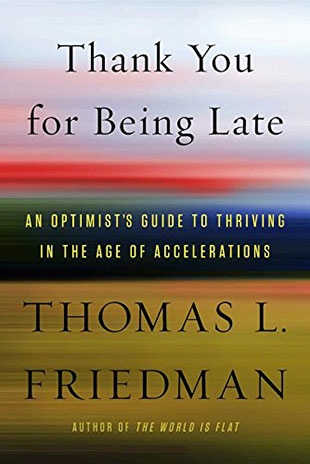In this bestselling look at who we are and where we are going, Thomas Friedman quotes Ray Kurzweil, director of engineering at Google:
"We're entering an age of acceleration. The models underlying society at every level, which are largely based on a linear model of change, are going to have to be redefined. Because of the explosive power of exponential growth, the twenty-first century will be the equivalent to 20,000 years of progress at today's rate of progress; organizations have to be able to redefine themselves at a faster and faster pace."
We are living in out-of-control times where high speed is evident in everything from smart-phones, the Internet, the breakneck speed of films, and the competitive nature of businesses that see themselves as mean and lean. No wonder so many adults are tired all the time.
Friedman admits that it took him two-and-a-half years to do all the research for this book. He had to interview almost all the noteworthy technologists two or three times to insure that his writing was up-to-date. That is actually a stunning example of how the dizzying state of change is leaving people overwhelmed and exhausted. The author suggests antidotes which have been used by spiritual men and women for a long time: slowing down, taking pauses, being patient, and making space for reflection.
The accelerations are taking place in technology, the market (globalization), and Mother Nature (climate change and biodiversity loss). This speed is adversely affecting five essential realms: the workplace, politics, geographics, ethics, and community. Friedman claims that the appearance of the iPhone in 2007, gains in silicon chips, software storage, sensors, and networking opened the doors for a new technology platform he calls "Supernova."
As usual, this author's razzle-dazzle interpretation of the latest developments in a variety of fields makes for very interesting reading. To tally up the past, Friedman visits his childhood home in a suburb of Minneapolis where community life was shaped and sustained by an ethic of inclusion, pluralism, and civic idealism. Can we revive those virtues or are we too far down the road to reclaim or renew them?
